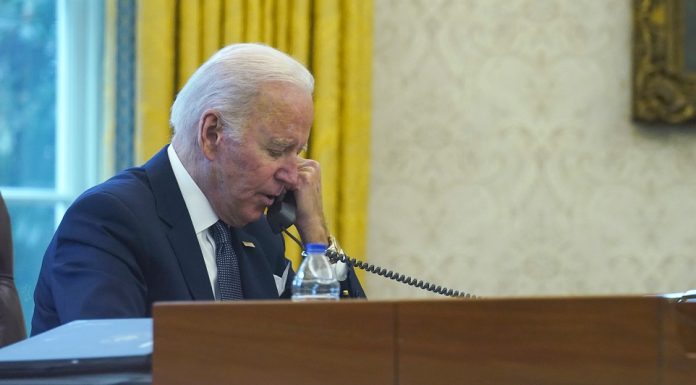(Headline USA) President Joe Biden reached out to Ukraine’s leader Thursday and advised him to cede territorial control in the eastern Donbas region to Russian-backed separatists.
But any negotiations to peacefully resolve Europe’s tangled East-West rivalries will present minefields for the U.S. president.
Biden made his offer of American diplomacy during a two-hour online session with Russian President Vladimir Putin on Tuesday, while repeating warnings of tough new sanctions and increased defensive aid to the region if Russia does invade.
Biden proposed joining the Europeans in negotiations not just to settle the conflict in eastern Ukraine but to address Putin’s larger strategic objections to NATO expanding its membership and building military capacity ever closer to Russia’s borders.
Biden spoke with Ukrainian President Volodymyr Zelenskyy by phone for more than an hour Thursday.
In a tweet, the Ukrainian leader said the two “discussed possible formats for resolving the conflict in Donbas and touched upon the course of internal reforms in Ukraine.”
Administration officials have suggested that the U.S. will press Ukraine to formally cede a measure of autonomy within its eastern Donbas region, which is now under de facto control by Russia-backed separatists who rose up against Kyiv in 2014.
Decentralization of Ukraine and a “special status” for Donbas were laid out in an ambiguous, European-brokered peace deal in 2015, but it has never taken hold.
More autonomy could formally give residents of that region more authority over some local issues.
The administration officials made no mention of ceding any territory, and Biden has said that Ukraine’s sovereignty and territorial integrity are not on the table for the U.S.
Biden also will have to finesse Ukraine’s desire to join NATO. The U.S. and NATO reject Putin’s demands that they guarantee Ukraine won’t be admitted to the Western military alliance.
But senior State Department officials have told Ukraine that NATO membership is unlikely to be approved in the next decade, according to a person familiar with those private talks who spoke on condition of anonymity.
For Biden, the challenge will be encouraging Kyiv to accept concessions to Russia in eastern Ukraine, without appearing to cave to Putin.
Ukraine may be asked “can you make some step forward on these areas,” said Steven Pifer, a former U.S. ambassador to Ukraine.
That could include measures such as allowing the Russia-allied Donbas region to control its own health care, police and schools, he said.
“But I don’t see Washington pushing the Ukrainians to take steps that would compromise their sovereignty or the ability of the national government when it came to making decisions,” Pifer said.
In a statement after his call with Biden, Ukraine said Zelenskyy was offering “clear proposals to unblock the peace process and is ready to discuss them in various formats.”
Ukraine, a former Soviet republic with deep cultural and historic ties to Russia, has in recent years been pulled toward closer integration with the West and membership in NATO.
The alliance has held out the promise of membership but it has declined to set a timeline. Even before the current crisis, Ukraine was a long way from joining.
Since 2014, however, when Russia invaded and annexed Crimea and then threw its weight behind the armed separatists in the industrial Donbas region, the United States and other NATO members have been helping Ukraine build up its defenses.
National security adviser Jake Sullivan stressed at a White House briefing after Biden’s call with Putin that “there was the delivery of defensive assistance to Ukraine just very recently, and that will continue.”
Pentagon press secretary John Kirby said Wednesday the last items in the administration’s latest $60 million package of security assistance to Ukraine are arriving there this week and consist mainly of small arms and ammunition.
Adapted from reporting by the Associated Press.

